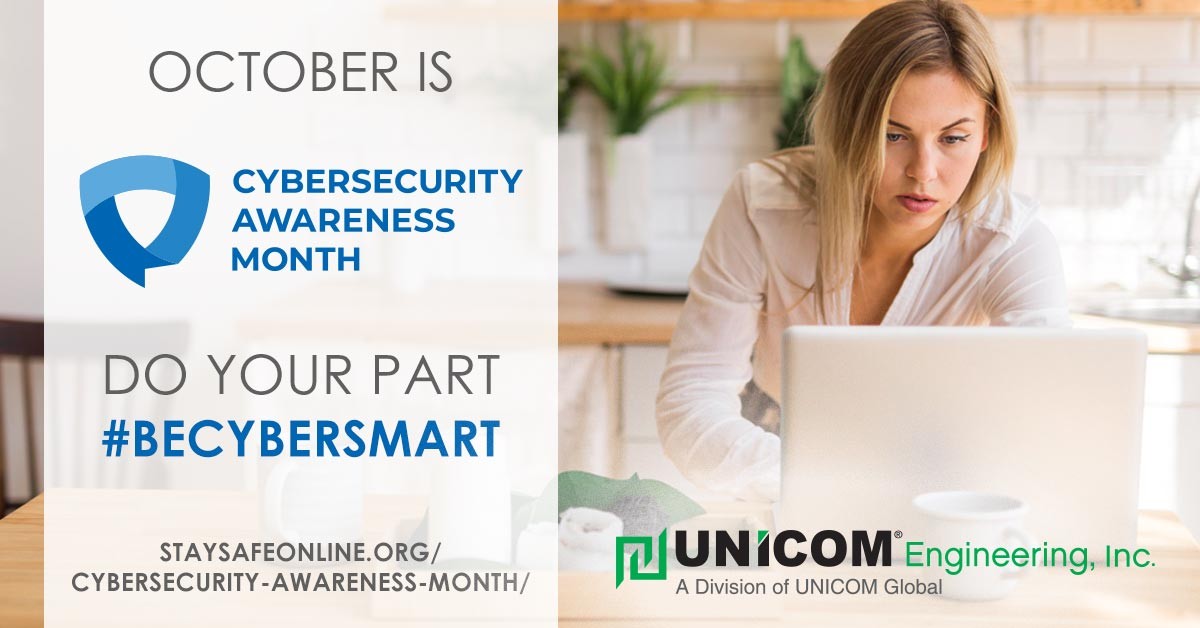In a year inundated with diverse challenges worldwide, it is safe to say that 2020 has altered the way we live and work, with many companies quickly shifting to remote workstations. These changes lead many workers to be more dependent on technology than ever before. While the advances in technology that have helped connect us are innovative and intriguing, they pose a new security risk set. With National Cybersecurity Awareness Month (NCSAM) upon us, we highlight this year’s theme, ‘Do your part. #BeCyberSmart.’ This blog will discuss how working remotely has impacted businesses and solutions for securing work-related and home devices.
The possibility of employees’ unsafe data practices compromising a company’s security is of grave concern, and rightly so as hackers and threat actors upped their game during the lockdown. About 20% of business leaders state their company has experienced a security breach, which correlated to the high volume of employees working from home during the pandemic. These findings were recounted in a recent report published by Malwarebytes. Additionally, polling indicated that cybersecurity leaders believe a hybrid working structure (remote and office work) adds further pressure to their teams to stay on top of incoming threats than ever before.
Making profound changes and transformation to business practices and procedures typically take lengthy planning sessions and traditionally involves thorough procedures to mitigate risks. With the sudden onset of COVID-19, companies could not abide by these commonly strict guidelines during the early months of 2020. This forced companies to scramble with unprecedented speed to build and scale infrastructure to support a largely remote working environment. Phishing attacks and malware attempts were on the rise due to unscrupulous hackers and threat actors to steal sensitive data.
With great information and resources provided by NCSAM, now is the time to emphasize the impact of potential data breaches and the importance of securing work and personal data. It is vital employees are conscious of the vulnerabilities for the safety of themselves and their company. The following tips can also help employees protect their business and personal data, so they’re not victims of identity theft or a security breach:
- Eliminate factory-default passwords and improve routine passwords on both corporate and personal devices. A complex and secure password with the addition of a two-step authentication feature is highly recommended.
- Stolen devices are more likely to be found with software applications such as “Find my Phone/Laptop,” which allow lost devices to be found, or stolen devices locked or wiped.
- Install antivirus/anti-malware on all devices and maintain regular software updates.
- Separate work devices on home networks from other home internet devices by using a guest network and connect through a VPN to ensure traffic is encrypted and secure.
As more people work remotely, our businesses are more interconnected than ever. National Cybersecurity Awareness Month reminds us to reevaluate our stance on security continuously. While many of the risks associated with remote offices may seem intimidating, the actions above can ensure that both corporate and personal devices are secure in the long-term. UNICOM Engineering hopes to impart cybersecurity awareness, not just in October but all year long.
Do Your Part #BeCyberSmart
National Cybersecurity Awareness Month is co-led by the National Cyber Security Alliance (NCSA) and the Cybersecurity and Infrastructure Agency (CISA) of the U.S. Department of Homeland Security. As a Cybersecurity Awareness Month Champion, UNICOM Engineering is part of a growing global effort to promote online safety and privacy awareness. Learn more about cybersecurity and ways to stay safe online at staysafeonline.org/ncsam.
